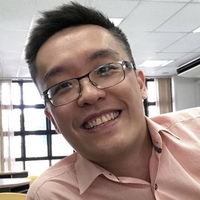
Kathy Bickmore
Kathy Bickmore is Professor in Curriculum and Pedagogy and Director of the Comparative International and Development Education Centre and graduate specialization at OISE, University of Toronto. She studies and teaches about young people’s lived citizenship and state-funded 'regular school' learning opportunities relevant to building and making peace, gender equity, and just democracy, in comparative transnational, Indigenous First Nation, and Canadian communities.
Address: OISE-University of Toronto
252 Bloor Street West
Toronto, Ontario M5S1V6
Canada
Address: OISE-University of Toronto
252 Bloor Street West
Toronto, Ontario M5S1V6
Canada
less
Related Authors
Crystena A . H . Parker-Shandal
University of Waterloo
Liana Clarysse
University of Toronto
Ahmed Salehin Kaderi
University of Toronto
Yomna Reda
University of Toronto
angelica radjenovic
George Brown College
Brenda Morrison
Simon Fraser University
InterestsView All (21)







Uploads
Papers by Kathy Bickmore
2
understandings of environmental and other economic resource conflicts they experienced locally, and what they believed citizens like themselves could do to mitigate or transform the roots of those conflicts. We compare these young people’s representations to those in the enacted curricula, described by the students and their teachers in separate focus groups. This paper focuses on participants’ perspectives about social conflicts in which tangible material (resource) interests are prominent, as these most clearly illustrate the disjuncture between narrow neoliberal-individualist and broader critically-global-minded dimensions of (peacebuilding) citizenship education.
violencia: desafíos transnacionales a la construcción de
paz en escuelas de México)
Comparative international education as a field has always carried a concern for peace, including international understanding and amelioration of harms such as injustice and poverty (Burns, 2008). This chapter reviews international and comparative scholarship on education for democratic peacebuilding, primarily in societies suffering current or recent escalated destructive conflict (repression, gang violence, war or division).
This paper discusses findings from focus groups with youth located in underprivileged surroundings in one large multicultural city in Canada and in a moderately large city in Mexico, examining their understandings and lived experiences of migration-related conflicts. Canadian participants framed these conflicts as a problem of racist attitudes towards immigrants in an otherwise welcoming city. Mexican youth understood emigration as a questionable individual dream to overcome precarious economic conditions, bringing about violence to those travelling and family fractures for those who stay. We identify tensions between these dominant narratives about mobility and conflict – usually also present in intended curriculum – and students' first-hand, every day experiences with migration in each setting. We point out to youths' contrasting imaginaries of citizenship – sense of agency and identity positions – with regards to migration in each setting, showing the limited opportunities they have to make sense of their lived (globalized) conflicts beyond their own localized cultural explanations. We argue that connecting the recognition of cultural differences in the world with the power imbalances, unequal positions, and historically structured global inequities revealed by issues such as migration, must become a crucial effort in citizenship education on global issues.
& Hughes, 2006). Education for democratic social justice and sustainable peace disrupts the existing social order, surfacing conflict and uncertainty. Such peacebuilding citizenship dialogue is rarely fully implemented or sustained in most North American classrooms, especially those serving non-affluent and
heterogeneous student populations (also Kahne & Middaugh, 2008). Drawn from a larger study on implementation of peace-building dialogue in school settings (see Bickmore 2014 in Curriculum Inquiry), this paper examines case studies of three contrasting professional development initiatives in which public school teachers did have opportunities to develop skills, understandings, and confidence for facilitating such
conflictual conversations in their classrooms.
2
understandings of environmental and other economic resource conflicts they experienced locally, and what they believed citizens like themselves could do to mitigate or transform the roots of those conflicts. We compare these young people’s representations to those in the enacted curricula, described by the students and their teachers in separate focus groups. This paper focuses on participants’ perspectives about social conflicts in which tangible material (resource) interests are prominent, as these most clearly illustrate the disjuncture between narrow neoliberal-individualist and broader critically-global-minded dimensions of (peacebuilding) citizenship education.
violencia: desafíos transnacionales a la construcción de
paz en escuelas de México)
Comparative international education as a field has always carried a concern for peace, including international understanding and amelioration of harms such as injustice and poverty (Burns, 2008). This chapter reviews international and comparative scholarship on education for democratic peacebuilding, primarily in societies suffering current or recent escalated destructive conflict (repression, gang violence, war or division).
This paper discusses findings from focus groups with youth located in underprivileged surroundings in one large multicultural city in Canada and in a moderately large city in Mexico, examining their understandings and lived experiences of migration-related conflicts. Canadian participants framed these conflicts as a problem of racist attitudes towards immigrants in an otherwise welcoming city. Mexican youth understood emigration as a questionable individual dream to overcome precarious economic conditions, bringing about violence to those travelling and family fractures for those who stay. We identify tensions between these dominant narratives about mobility and conflict – usually also present in intended curriculum – and students' first-hand, every day experiences with migration in each setting. We point out to youths' contrasting imaginaries of citizenship – sense of agency and identity positions – with regards to migration in each setting, showing the limited opportunities they have to make sense of their lived (globalized) conflicts beyond their own localized cultural explanations. We argue that connecting the recognition of cultural differences in the world with the power imbalances, unequal positions, and historically structured global inequities revealed by issues such as migration, must become a crucial effort in citizenship education on global issues.
& Hughes, 2006). Education for democratic social justice and sustainable peace disrupts the existing social order, surfacing conflict and uncertainty. Such peacebuilding citizenship dialogue is rarely fully implemented or sustained in most North American classrooms, especially those serving non-affluent and
heterogeneous student populations (also Kahne & Middaugh, 2008). Drawn from a larger study on implementation of peace-building dialogue in school settings (see Bickmore 2014 in Curriculum Inquiry), this paper examines case studies of three contrasting professional development initiatives in which public school teachers did have opportunities to develop skills, understandings, and confidence for facilitating such
conflictual conversations in their classrooms.